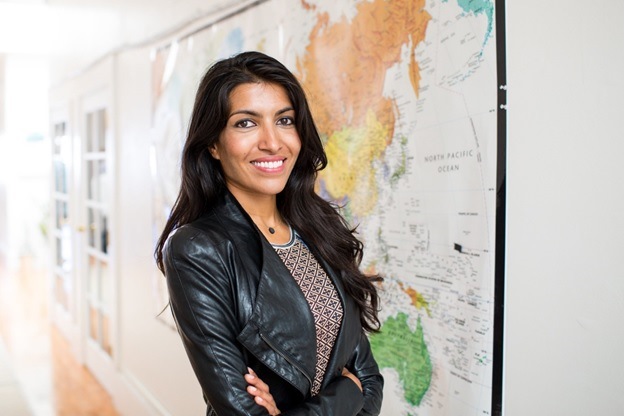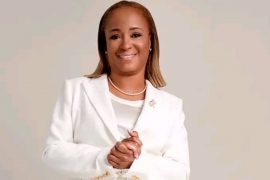A life of success is not termed an achievement until impact is made. Impact is to meet the needs of others directly or indirectly, it is to benefit others through your success and also to positively affect the life of others through your journey in life.
While a number of people are aware of this phenomenon, a large number have left this ideology behind. Speaking of those who are fully aware of this great advantage, let’s consider Leila Janah who is a sun setting on some rural parts of the world.
Janah is the daughter of Indian immigrants who left Mumbai in the late 70’s to the United States in search of a greener pasture. Her parents were learned and had no intentions for education in the states but to raise their standard of living which was a priority.
On getting to US they had their first child Leila on the ninth of October 1982 in Lewiston, New York, near Niagara Falls. Janah was raised in San Pedro, Los Angeles, California in a poor family; she had an unpleasant growing up based on the financial crisis her family suffered at that time.
Her mom who is half-Belgian had a degree in English literature before leaving Mumbai, her father studied engineering but both their certificates were not recognized which led them to struggle for their living.
Janah had to babysit and do other jobs including tutoring to earn a living as a teenager, however through it all she was determined and focused to make life perfect for herself; though she encountered difficulty in climbing the ladder to success but over time she made it.
During her years of struggles, she won a scholarship while schooling at the California Academy of Mathematics, at that time she was 17, the scholarship came through the American Field Services, but Janah desired to spend her scholarship years in Ghana she tried convincing them to allow her spend it teaching in Ghana. She was granted her request and she moved to Ghana where she spent 6 months during her senior year of high school.
While in Ghana, Janah helped tutor young students in the village of Akuapem English language because she had gathered a very practical experience in teaching, which was one of the jobs she did to earn a living back in the United States.
Many of the children whom she taught were disabled in their sight but her experience in Ghana left a mark in her. The teaching experiences in Ghana left her with a burning desire to work for the poorest society in Africa, and many other under-privileged parts of the world.
At this point her humanitarian journey had begun to bear foot print unconsciously. Leila began a continued visit to Africa during her college days.
Grace continued to shine on her and she received admission to study African Development Studies in Harvard University, graduating in 2005. With so much enthusiasm for Africa, she conducted a fieldwork in Mozambique, Senegal and Rwanda while studying in Havard. She consulted to and authored papers for the World Bank’s Development Research Group and Ashoka on social and economic rights.
After graduating from Harvard, she got a job to work as a management consultant with Katzenbach Partners. The job brought a major turning point in her life that established her dreams.
The nature of her job was for her to pay attention to healthcare, mobile and outsourcing companies. While in Katzenbach, she was given a major assignment that opened a link for her to her motherland. The assignment entails managing a call center in Mumbai. She moved to India to begin her assignment when she met a young man who traveled each day by rickshaw from Dharavi, one of the largest slums in South Asia, to work at the center. The situation caught her attention and having to remember her experience in Ghana, she was inspired to proffer a solution.
While thinking of a suitable solution, she resigned from Katzenbach Partners in 2007 to become a visiting scholar at Stanford University with the Program on Global Justice, founded by law professor Joshua Cohen.
She won a business-plan competition at Stanford of $14,000, with that, she already had a solution to the problem of poverty.
She took the money and launched out to establish Samasource (Sama is Sanskrit for “equal”) in 2008. Samasource is a non-profit business with the aim to meet the needs of poor individuals and reduce global poverty through job provision. It involves sourcing people in Africa and Asia to perform digital tasks for companies like Google and LinkedIn. Ever since the inception of Samasource, it has been a huge success, imparting the lives of over 32,265 people.
However, there was a need to enlighten the people, so in 2013, she established Samaschool, a learning arm of Samasource that provides digital skills training and a connection to internet-based jobs that pay a living wage.
In 2012, Janah went on to launch Samahope; a platform that directly sponsors the medical treatments for women and children in poor communities. Samahope is the first of its kind and is in partnership with Johnson & Johnson’s new global health platform, Caring Crowd, at the end of 2015.
Based on her humanitarian service and philanthropic works, she has been recognized and honored in many ways including being the Young Global Leader of the World Economic Forum, recipient of the inaugural Club de Madrid Young Leadership Award.
Janah is also the co-founder of LXMI, luxury skin care brand, a business that proffers beauty and skin solutions. In 2014, she received a Heinz Award being, the only young person amongst the nominees, and many other honors and awards.





Comments are closed.